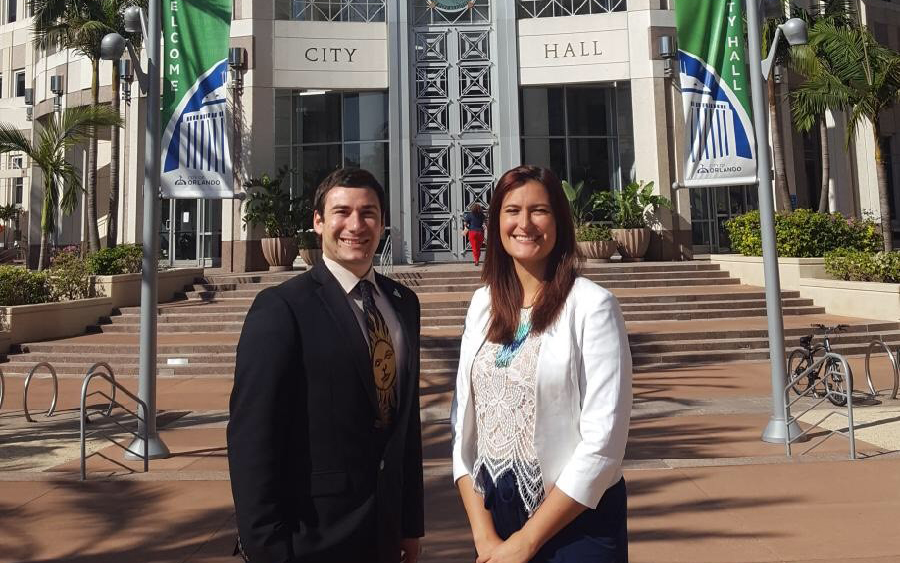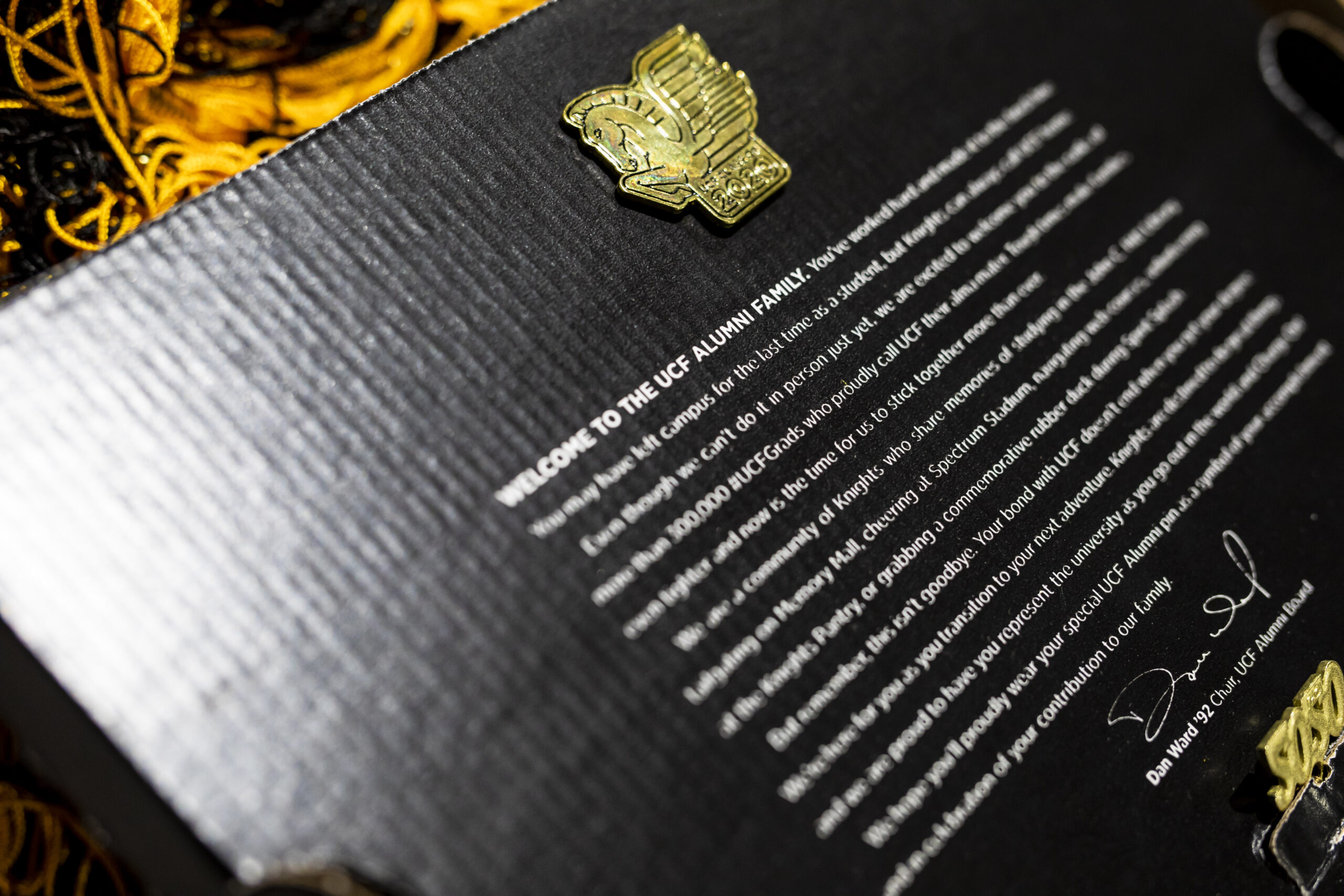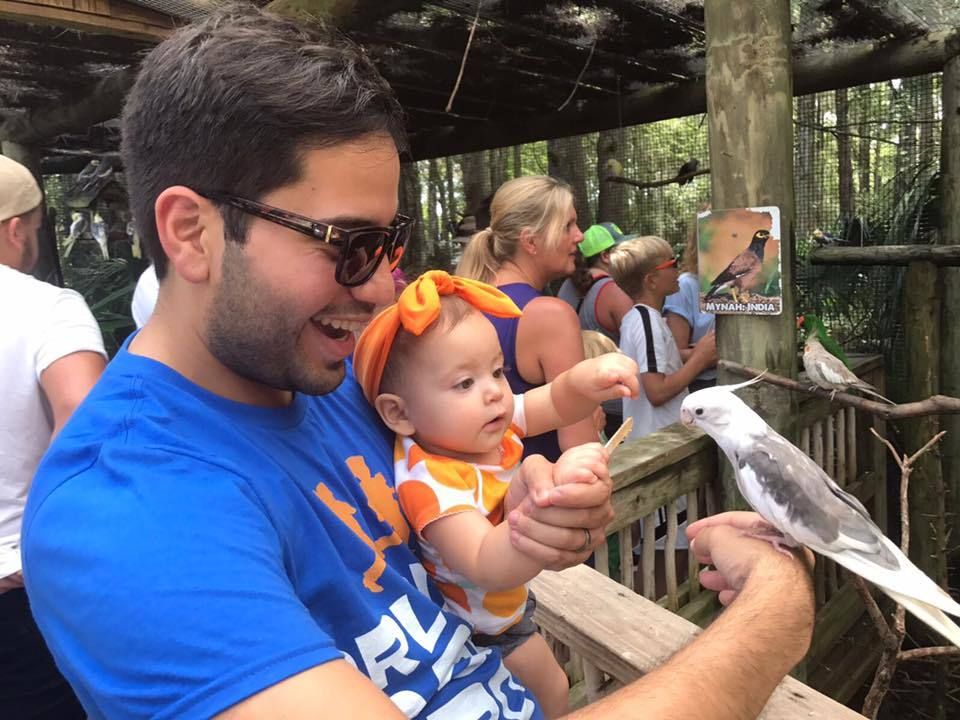UCF Alumni Building A More Sustainable Orlando

By Jenna Marina Lee
ORLANDO, Fla. (April 19, 2018) — The sounds of construction can be heard on the third floor of Orlando City Hall. The building is being retrofitted with energy efficient technology as part of the City of Orlando’s sustainability initiatives.
It’s one of the many projects currently underway and supervised by sustainability director Chris Castro ’10 and sustainability project manager Brittany Sellers ’13MA ’16PhD. From the moment the UCF alumni step in their offices, they are literally surrounded by the results of their labor of love.
Their daily mission, especially on April 22’s Earth Day, is to transform Orlando into one of the most environmentally friendly cities in the country. That’s not exactly easy to do when one of the world’s top tourist destinations is also Forbes’ fourth-fastest growing city in America for 2018.
“When you look at Orlando from a long-term sustainability standpoint, 30-40-50-plus years from now, the amount of energy, the amount of water we’re consuming, the amount of waste that we are generating, is unsustainable,” Castro says. “At a certain point, our economy could become impacted negatively if we don’t start proactively paying attention to that.”
Easy Being Green
Castro and Sellers have been paying attention for quite a while.
Castro, the son of palm tree farmers in Miami, arrived at UCF in 2007 as an undeclared major. In his first year, he enrolled in a class taught by Penelope Canan, a nationally recognized professor for her environmental and sociology research. After taking her environmental sociology course, he knew he wanted to dedicate his life and career to sustainability.
He jumped in immediately by starting IDEAS for UCF, a sustainability-focused student organization. The group welcomes students of all majors and interests, and it focuses on originating solutions to make UCF’s campus more sustainable.
One of its first major achievements was receiving a commitment from President John C. Hitt and UCF to become a carbon neutral campus by 2050. IDEAS worked on programming and policies to help make strides toward that goal.
“I saw UCF as this unbelievable opportunity. For me, it was the best Petri dish that any student could ever imagine,” Castro says. “Everything I was doing through campus, I’ve now tried to expand it and take it to real life and the municipal government.”
One of the group’s programs, the Kill-A-Watt energy conservation competition, challenged students living in dorms to compete against each other in energy consumption reduction.
Sellers heard about the project as a human factors psychology doctoral student and wanted to study the challenge Castro helped implement as part of her dissertation.
She examined the project with a behavioral lens. How were students living in older dorms competing against students in newly constructed dorms? What if students couldn’t easily access sockets to unplug electronics? Did they know what the challenge on campus meant in the bigger picture of impacting climate change globally?
“Information does not equal action. People can know to do the right thing but there are all these other factors, and we need to look at what that means. What are the elements that can make it more possible?” Sellers says. “My transition to the department of sustainability at the city was pretty seamless even though I had come in as a psychology researcher. It might not seem like the most logical jump. But from the interdisciplinary approach I had in my education, it all made sense. A lot of that was fostered at UCF.”
People, Planet and Prosperity
Castro joined City of Orlando Mayor Buddy Dyer’s sustainability department full time in 2014, and Sellers joined soon after in 2015 before graduating with her doctorate a year later.
The two have brought their expertise to Dyer’s Green Works initiative, which began in 2007. Every day, these Knights and their team – which includes energy project manager Ian LaHiff ’09, sustainability associate Joe England ’09 ’12MA and public outreach coordinator Daniel Friedline ’13 – are shaping the policies and actions that make Orlando and Central Florida a more livable, vibrant and sustainable place to live.
“Sustainability is about changing that mindset to get people looking at people, planet and prosperity. It’s about the triple-bottom line: social, economic and environment,” Castro says. “The fact is, we won’t have an economy if our people are dying and are sick. We won’t have an economy if the natural resources in our environment that we depend on aren’t there. So what cities are positioning to do in our office and our roles is to figure out how we can change our operations internally, and externally, how we can change our culture to embrace the triple-bottom line.”
The first phase of the Green Works program focused internally on city operations. The city knew it needed to buy in to what it was asking of its residents, so it began upgrading municipal building features to minimize energy consumption. It lowered water usage, diverted waste and transitioned its fleet vehicles to alternative fuels.
In 2013, Green Works took what it learned from its internal changes and applied its success outward to the community to foster a culture that embraced sustainability.
To keep from getting overwhelmed, Castro and Sellers focus on making progress in six key areas: energy and green buildings; local food systems; solid waste; livability (planting trees, pedestrian and bicycle trails, expanding parks); transportation; and water. Within each area are policies and actions needed to make their goals happen by 2040.
There are measures like developing plans for solar generation on rooftops in support of Orlando’s 100 percent renewable energy commitment – one of 50 cities in the country to undertake such a monumental task. Or transforming all downtown LYMMO buses into all electric zero-metric buses. Or adding electric motorcycles for the Orlando Police Department. Or addressing food insecurity with farmers markets that accept SNAP benefits. Or fleet farming, exactly like the food being grown in plant beds outside of UCF’s Student Union.
“We could be here all day,” Sellers says as Castro and she list one example after another.
Castro and Sellers estimate their office juggles 40-50 projects simultaneously at any given time, and even though the work is demanding, Sellers says she is excited to be part of the team and takes prides in the work they accomplish every day, especially in the city where her alma mater is located.
While some may say they’re ‘saving the world,’ she prefers to look at it from a slightly different perspective.
“I like when we go out and do good things, you see that light spark in other people. You ignite that desire to do the right thing, the good thing. So I like to frame that as ‘amplifying the good that already exists in the world,’” she says. “Sometimes we’re changing hearts and minds and there’s an evolution, but at the same time, for a lot of people, this already lies within them, and we’re just kind of empowering and enabling that in them.”
Power of One
While they are certainly leading the charge, they want everyone to understand the role each individual can play in helping the city’s progress toward a better future for Orlando.
Castro points to a phone call he received recently from a concerned citizen about an oak tree that was scheduled to be cut down because of development. The individual asked if something could be done to stop trees like the oak from being cut down in the future.
Now, Castro’s team along with the parks and planning teams will collaborate on exploring ways to improve tree ordinances and protect Orlando’s urban forest.
“That all happened because of one individual. That voice goes an extremely long way,” Castro says.
They’ve made it a priority to provide tools and information to the public on their website www.cityoforlando.net/greenworks as well as host community forums to encourage others to use their voices.
Castro and Sellers both agree that the single biggest aspect about sustainability that people do not realize is the effect one individual can have in making a difference.
“Changing out your light bulbs, changing one degree in your home [thermostat], unplugging appliances, changing your diet, carpooling or ride sharing or alternative modes of transit,” Castro says, “little by little, these actions in a collective sense, make a huge global impact.”


